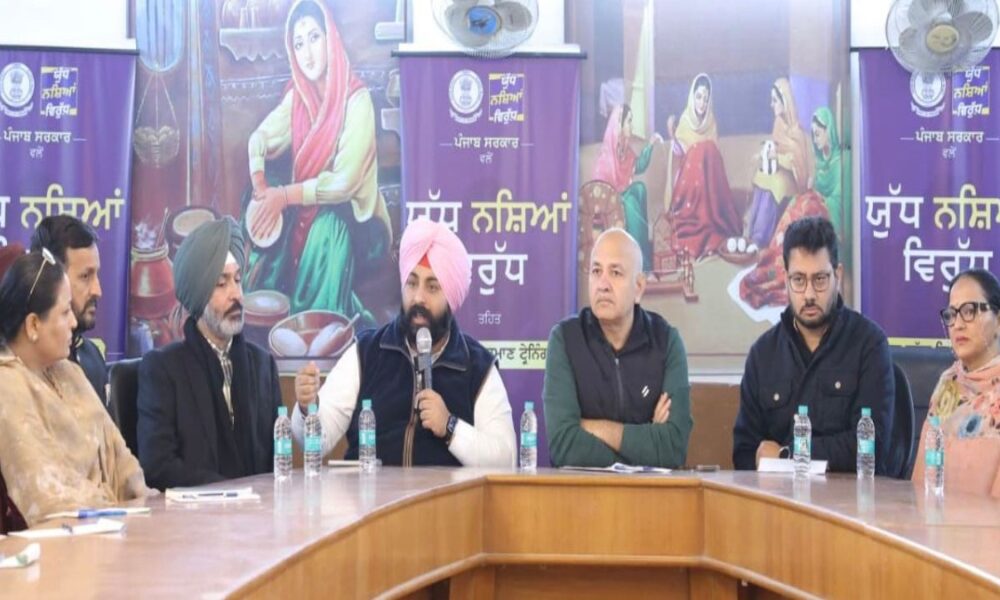पंजाब में कानून-व्यवस्था को लेकर आम आदमी पार्टी (आप) और भारतीय जनता पार्टी (भाजपा) के बीच टकराव बढ़ता जा रहा है। अबोहर में कपड़ा व्यापारी संजय वर्मा की हत्या के बाद आम आदमी पार्टी ने भाजपा पर गैंगस्टरों को संरक्षण देने का गंभीर आरोप लगाया है। इसके विरोध में आप नेताओं और कार्यकर्ताओं ने राज्य के कई जिलों — जैसे जालंधर, पठानकोट, अमृतसर, लुधियाना, पटियाला और अबोहर — में बड़े पैमाने पर प्रदर्शन किया।
आप का आरोप: भाजपा कर रही गैंगस्टरों की पैरवी
आप नेताओं ने भाजपा नेता मनजिंदर सिंह सिरसा के उस बयान की कड़ी निंदा की जिसमें उन्होंने अबोहर हत्याकांड के आरोपियों के समर्थन में टिप्पणी की थी। प्रदर्शन कर रहे आप नेताओं का कहना था कि भाजपा लगातार पंजाब का माहौल खराब करने की कोशिश कर रही है और लॉरेंस बिश्नोई जैसे खतरनाक गैंगस्टरों को केंद्र सरकार की जेलों में संरक्षण दिया जा रहा है।
‘डबल स्टैंडर्ड नहीं चलेगा’
आप विधायकों और मंत्रियों ने कहा, “एक तरफ भाजपा दावा करती है कि पंजाब में कानून व्यवस्था खत्म हो चुकी है, और दूसरी तरफ जब राज्य सरकार गैंगस्टरों के खिलाफ सख्त कार्रवाई करती है, तो भाजपा नेता उन्हीं गैंगस्टरों के समर्थन में खड़े हो जाते हैं। यह दोहरा रवैया अब बर्दाश्त नहीं किया जाएगा।”
सिरसा को पंजाब से माफ़ी मांगनी चाहिए: आप विधायक
आप नेताओं ने मांग की कि भाजपा नेता मनजिंदर सिरसा को पंजाब के लोगों से माफी मांगनी चाहिए। उन्होंने कहा कि सिरसा गैंगस्टरों के एनकाउंटर पर सवाल उठाकर पंजाब पुलिस का मनोबल तोड़ने की कोशिश कर रहे हैं। इसके साथ ही, भाजपा नेताओं द्वारा सरकार पर कानूनी कार्रवाई की धमकी देना भी दुर्भाग्यपूर्ण है।
‘केंद्र की दखलअंदाजी मंज़ूर नहीं’
आप नेताओं ने स्पष्ट कहा कि केंद्र सरकार की शह पर अगर किसी व्यापारी, आम नागरिक या व्यवसायी को डराने-धमकाने की कोशिश की गई, तो पंजाब सरकार चुप नहीं बैठेगी। उन्होंने कहा, “हम पंजाब में किसी भी बाहरी दखलअंदाजी को स्वीकार नहीं करेंगे। यह राज्य की जनता और उनकी सुरक्षा का मामला है।”
‘अकाली, कांग्रेस और भाजपा – एक ही थाली के चट्टे-बट्टे’
प्रदर्शन कर रहे नेताओं ने कहा कि पंजाब में अब अकाली दल, भाजपा और कांग्रेस जैसी पार्टियों का कोई अस्तित्व नहीं रह गया है, इसलिए वे मिलकर आम आदमी पार्टी की सरकार को बदनाम करने की कोशिश कर रही हैं। लेकिन पंजाब की जनता अब सब समझती है और उन्हें जवाब जरूर देगी।
‘पंजाब दशकों से झेल रहा है संताप, अब होगा न्याय’
आप नेताओं ने कहा कि पंजाब लंबे समय से नशे, गैंगस्टरवाद और जल संकट जैसी समस्याओं से जूझता आ रहा है, लेकिन आज भगवंत मान के नेतृत्व में सरकार इन सभी मुद्दों पर गंभीरता से कार्रवाई कर रही है। नशा तस्करों से लेकर गैंगस्टरों तक, किसी को नहीं छोड़ा जा रहा है।
उन्होंने कहा, “पंजाब की जनता को कमजोर करने की कोशिश बहुत हुई, अब समय है इसे मजबूत करने का। हमारी सरकार पंजाब को सुरक्षित, शांत और खुशहाल बनाने के लिए प्रतिबद्ध है।”
यह विरोध प्रदर्शन साफ तौर पर यह संकेत दे रहा है कि आम आदमी पार्टी भाजपा की नीतियों और रवैये से बेहद नाराज़ है और पंजाब में कानून व्यवस्था को लेकर किसी भी राजनीतिक दबाव के आगे झुकने को तैयार नहीं है। AAP ने साफ कर दिया है कि गैंगस्टरों और माफियाओं के खिलाफ लड़ाई हर हाल में जारी रहेगी।


